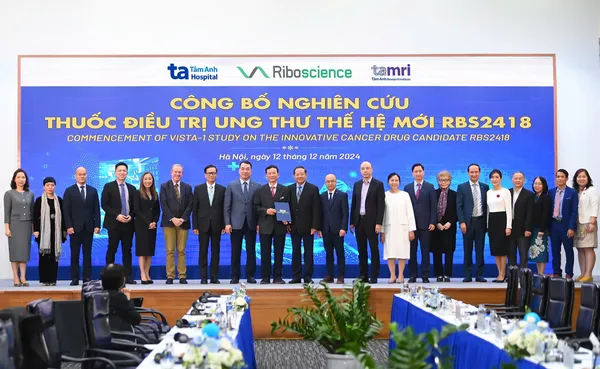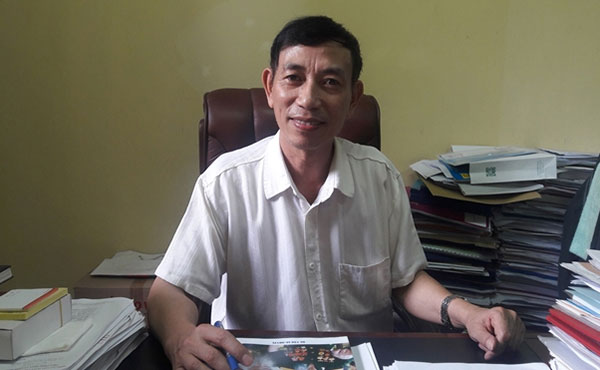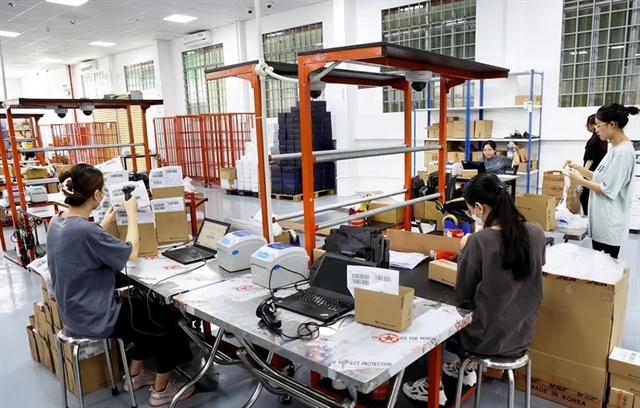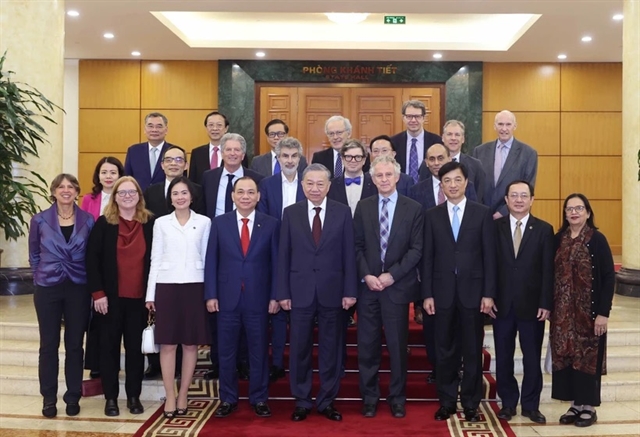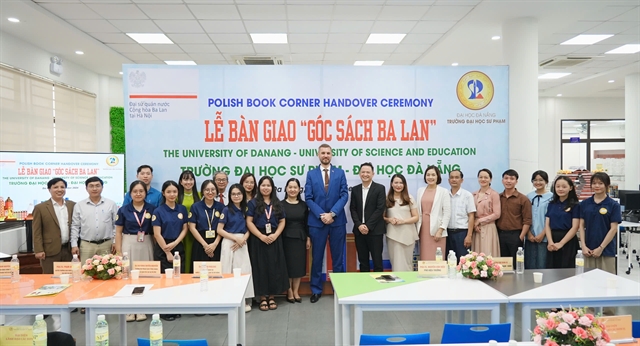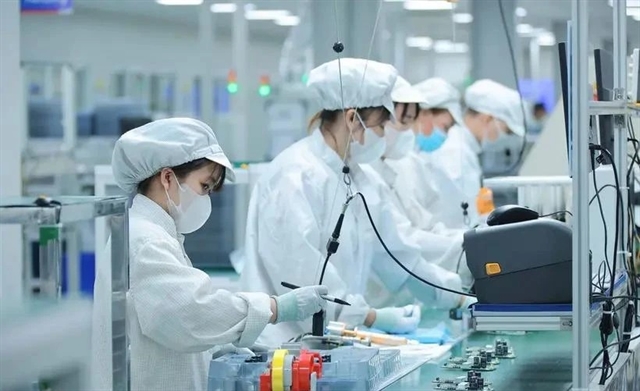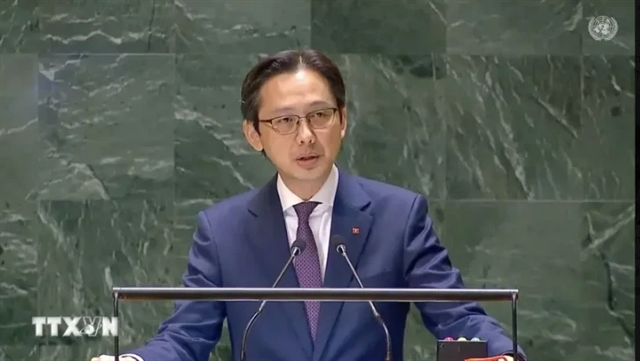

A group of villagers have stopped using chemicals on their crops. To be even more “green”, they have also stopped using plastic bags.

|
| Tourists visit an organic garden in Thanh Đông Village in Hội An. The farm has become a favourite site for educational trips and tourists as well as a source of safe food for local residents. VNS Photo Chu Mạnh Trinh |
by Bùi Hoài Nam
A group of farmers in Thanh Đông Village, nestled in the busy suburban tourist destination of Hội An's Cẩm Thanh Commune, have transformed their land into a healthy organic garden and a favourite rendezvous for nature lovers by moving away from their prolonged use of pesticides and fertiliser.
It was one of the first villages in the suburbs of Hội An that completely stopped using chemical-based nutrients and protective substances, setting the stage for the development of a unique organic agricultural destination.
Now, the one-hectare garden in Thanh Đông Village supplies certified organic vegetables for the residents of Hội An and is soon expected to provide herbs to businesses to produce organic essential oils.
Lê Nhượng, head of Thanh Đông organic co-operative, said the first 10 farmers voluntarily began using organic farming practices in 2014 before introducing their first product free from chemicals in 2016.
Nhượng said that before the switch the over-use of chemical fertilisers, pesticides and growth simulators had exhausted the natural nutrients in the soil, forcing farmers to continue using the artificial products to see results.
“It’s like we were returning the old farming model our ancestors used in past centuries," Nhượng said. "The natural structure has slowly returned to the farm and we gradually replaced chemicals with environmentally friendly 'green fertiliser' to provide nutrition for vegetables."
“Elephant grass – a tufted perennial grass that can grow tall – was planted as a boundary for the farm to isolate the influence of pesticide, weed-killer and fertiliser from neighbouring farms," he said. "Meanwhile leaves, kitchen ash and cow dung are processed to use as compost to improve soil fertility."
He said natural farming practices have helped farmers improve their skills by forcing them to visit their crops every day.
Lê Thị Bôi, 68, visits the garden twice a day to wipe out grass and clear away insects – the practice that she did not do before.
“Previously, farming productivity was based mostly on chemical fertiliser and stimulants, and we rested for days after spraying weed-killer and pesticides. But now we go to the garden very often with assigned work each day,” she said, adding that cultivation was only halted for two months during the rainy season each year.
“All households are working together on the farm," she said. "We recognised that fostering natural harmony and peaceful coexistence between insects, flowers and plants can bring us a bumper harvest."
The old farmer said flowers were grown on the farm to lure birds, bees, ants and beetles to protect plants from harmful insects. Meanwhile, spices – ginger, chilli and garlic – were used as a natural pesticide.
“It has been a big change for us," Bôi said. "We earn much more from safe and fresh products and the working environment is healthier since we no longer breath in poisonous air emitted from chemical fertiliser and pesticides.”
Each member of Thanh Đông Co-operative now can earn around VNĐ60 million (US$2,600) per year – 30 per cent higher than before – from the organic vegetable farm.
The farm has also become a destination for tourists looking to learn about farming or cooking, with 3,500 visitors last year.
Nhượng said visitors can explore the farm by paying the VNĐ30,000 ($1.3) entrance fee and VNĐ150,000 ($6.5) for a tranquil lunch.
Brand building
He said produce from the co-operative is labelled with the symbol of Hội An – a UNESCO world heritage site – and sold at shops in Đà Nẵng and Hội An as well as online.
The village was the first rural area near Hội An to ban plastic bags and promote the sorting or rubbish to aid in recycling.
The village of 1,000 residents has made plans to grow rice and vegetables on an expanded area of 20ha.
Vice chairman of the Hội An People’s Committee Nguyễn Thế Hùng said Thanh Đông Village had been included in the 2016-20 master plan to boost organic farming, community-based ecological tourism and rural experience in the suburbs of Hội An.
“We assigned villages in the suburban communes of Cẩm Hà, Cẩm Kim, Cẩm Thanh and Cẩm Nam to form a complex of organic farming areas and provide eco-tourism services,” Hùng said.
“The organic farms will supply safe food for local residents and tourists and will provide herbs as a material to produce essential oils in the city in the near future,” he said.
Hùng said the organic farms in these communes have been designed as educational centres for college and school students.
He said developing these sites in the suburbs of Hội An also helped provide tourists with more options after they explored the UNESCO-recognised old quarter.
Chemical-free
Farmers in Cẩm Kim Village were next to follow suit, beginning to eliminate the use of chemical fertilisers last year.
Five households began a pilot project to cultivate a 3,500sq.m farm on the banks of the Thu Bồn River.
Head of the Cẩm Kim organic farm project, 54-year-old Phan Công Thiệu, said green fertilisers and herbal pesticides were used to replenish the soil's nutrients to make sustainable growing practices possible.
“We raised beds and mulch for crops by growing plants that enrich the nutrition of the soil over six months," Thiệu said. "The first crop was half damaged by harmful insects that moved from neighbouring farms, but the second crop was recovered by rotated planting."
"Insects that eat one vegetable cannot live on other plants," he explained. "Worms that destroy morning glory cannot eat the leaves of sweet potatoes."
"The cost of organic farming is often higher than using chemical fertilisers, but organic products earn double the income,” he said. "We are trying a healthy, environmentally friendly farm practice with fresh air, free of toxic chemicals to be a source of safe food."
Many villagers in Cẩm Kim have been encouraged not to use chemical fertilisers, pesticides or preservatives in their gardens to grow safe food.
Hội An has recently opened a plant to produce natural essential oils at Thanh Hà Industrial Park in the city in an effort to boost the use of local materials from organic farms.
The plant, the largest of its kind in central Việt Nam, has a capacity of one million units of oil from local herbs for cosmetics.
The director of the plant, La Ngọc Anh, said organic farms in the suburbs of Hội An would join the production chain by supplying at least 30 tonnes of local materials including sweet basil, peppermint, citronella, agarwood, coriander, Chinese parsley and pepper for use in shampoo, shower gel, skin cream, soap and perfumes.
He said the development of the production chain and the Hội An brand would help farmers earn more from their chemical-free agriculture. VNS
GLOSSARY
A group of farmers in Thanh Đông Village, nestled in the busy suburban tourist destination of Hội An's Cẩm Thanh Commune, have transformed their land into a healthy organic garden and a favourite rendezvous for nature lovers by moving away from their prolonged use of pesticides and fertiliser.
Nestled means “comfortably situated”.
Suburban means in the area of a town where people have their homes.
A destination is a place to where people travel.
If something is transformed, it is changed from one thing into something else.
An organic garden is one in which plants grow without the help of chemicals, either to make them or the soil richer or to kill pests.
A rendezvous is a place where people meet.
It was one of the first villages in the suburbs of Hội An that completely stopped using chemical-based nutrients and protective substances, setting the stage for the development of a unique organic agricultural destination.
Nutrients are the goodness that is in food.
If something is unique there is only one of it.
Now, the one-hectare garden in Thanh Đông Village supplies certified organic vegetables for the residents of Hội An and is soon expected to provide herbs to businesses to produce organic essential oils.
If vegetables are certified, it means they have passed a test.
Nhượng said that before the switch the over-use of chemical fertilisers, pesticides and growth simulators had exhausted the natural nutrients in the soil, forcing farmers to continue using the artificial products to see results.
Growth simulators are computer programmes that work out how well a plant will grow.
Artificial means “not natural”.
“It’s like we were returning the old farming model our ancestors used in past centuries," Nhượng said.
Your ancestors are your parents, grandparents, great grandparents and so on.
“Elephant grass – a tufted perennial grass that can grow tall – was planted as a boundary for the farm to isolate the influence of pesticide, weed-killer and fertiliser from neighbouring farms," he said.
Tufted grass grows in tufts, which are bunches.
A perennial grass lasts for a long time.
A boundary is a border.
"We recognised that fostering natural harmony and peaceful coexistence between insects, flowers and plants can bring us a bumper harvest."
Fostering means encouraging.
Harmony means pleasing and fulfilling.
Coexistence means living together.
A bumper harvest is a very good harvest.
The old farmer said flowers were grown on the farm to lure birds, bees, ants and beetles to protect plants from harmful insects.
Lure means attract.
"We earn much more from safe and fresh products and the working environment is healthier since we no longer breath in poisonous air emitted from chemical fertiliser and pesticides.”
Emitted means “sent out”.
He said produce from the co-operative is labelled with the symbol of Hội An – a UNESCO world heritage site – and sold at shops in Đà Nẵng and Hội An as well as online.
A co-operative is a farm where many people farm together and share the profits.
A UNESCO world heritage site is a place that is considered to be so important not just to the country in which it is situated but also to the whole world.
UNESCO stands for United Nations Educational, Scientific and Cultural Organisation.
The village was the first rural area near Hội An to ban plastic bags and promote the sorting or rubbish to aid in recycling.
To ban plastic bags means to not allow them.
The village of 1,000 residents has made plans to grow rice and vegetables on an expanded area of 20ha.
Expanded means “made bigger”.
Vice chairman of the Hội An People’s Committee Nguyễn Thế Hùng said Thanh Đông Village had been included in the 2016-20 master plan to boost organic farming, community-based ecological tourism and rural experience in the suburbs of Hội An.
Boost means improve.
“We assigned villages in the suburban communes of Cẩm Hà, Cẩm Kim, Cẩm Thanh and Cẩm Nam to form a complex of organic farming areas and provide eco-tourism services,” Hùng said.
A complex, in this case, means a group.
He said developing these sites in the suburbs of Hội An also helped provide tourists with more options after they explored the UNESCO-recognised old quarter.
Options are choices.
Farmers in Cẩm Kim Village were next to follow suit, beginning to eliminate the use of chemical fertilisers last year.
To eliminate the use of chemical fertilisers means to stop using them.
Five households began a pilot project to cultivate a 3,500sq.m farm on the banks of the Thu Bồn River.
To cultivate means to grow crops.
Head of the Cẩm Kim organic farm project, 54-year-old Phan Công Thiệu, said green fertilisers and herbal pesticides were used to replenish the soil's nutrients to make sustainable growing practices possible.
To replenish means to put nutrients back into the soil after they have been removed by crops that take them up.
Sustainable growing practices are practices that do not take up too much in the way of things like nutrients and water and make it possible for harvests to take place, year after year.
“We raised beds and mulch for crops by growing plants that enrich the nutrition of the soil over six months," Thiệu said.
Mulch is grass or straw, or wood shavings placed on the ground around a plant to stop weeds from coming up.
Enrich means “make richer”
"The first crop was half damaged by harmful insects that moved from neighbouring farms, but the second crop was recovered by rotated planting."
Rotated planting means planting in different fields at different times, giving ground time to rest.
"We are trying a healthy, environmentally friendly farm practice with fresh air, free of toxic chemicals to be a source of safe food."
Toxic means poison.
The plant, the largest of its kind in central Việt Nam, has a capacity of one million units of oil from local herbs for cosmetics.
Cosmetics are ointments people put on their skins to feel fresh and young.
The director of the plant, La Ngọc Anh, said organic farms in the suburbs of Hội An would join the production chain by supplying at least 30 tonnes of local materials including sweet basil, peppermint, citronella, agarwood, coriander, Chinese parsley and pepper for use in shampoo, shower gel, skin cream, soap and perfumes.
A production chain is the string of places products go through in their journey towards becoming a finished product.
WORKSHEET
State whether the following sentences are true, or false:
ANSWERS: 1. True; 2. True; 3. False; 4. False; 5. True.

